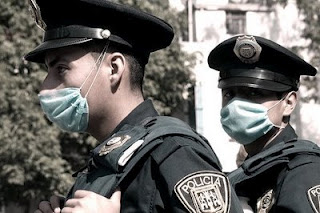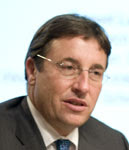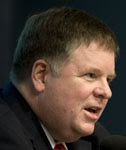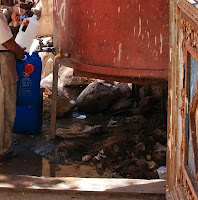Showing posts from category security.
-
Under Secretary Flournoy: Climate Change, Demography, Natural Resources Pose Security Challenges
›May 5, 2009 // By Rachel WeisshaarIn a recent talk (transcript) at the Center for Strategic and International Studies, Under Secretary of Defense for Policy Michele Flournoy (formerly of the Center for a New American Security) laid out five trends that are affecting U.S. national security:- The global economic recession;
- Climate change;
- Demographic shifts;
- Dwindling natural resources; and
- The spread of destabilizing technologies.
Here’s what Flournoy had to say on these trends:
Climate change: “I believe that over time, as the results of this manifest, it’s going to be an accelerant. It’s going to accelerate state failure in some cases, accelerate mass migration, spread of disease, and even possibly insurgency in some areas as weak governments fail to cope with the effects of global climate change.”
Demography: “In some regions we are seeing tremendous youth bulges. We can all point to a number of countries in the Middle East and elsewhere where the average age is 20 or younger. Contrast that with the number of aging societies in Europe, Japan, Russia where you see depopulation trend[s] happening in some of these major powers.”
Natural resources: “[K]ey natural resources are increasingly scarce and we are likely to see in the future [an] increase in competition for everything from oil, gas, water, and so that is likely to exacerbate some of our challenges.” -
Weekly Reading
›How Do Recent Population Trends Matter To Climate Change?, from Population Action International, offers the latest research from this constantly changing area of inquiry.
U.S. Global Health and National Security Policy, a timely report by the Center for Strategic and International Studies, examines major threats to human health and international stability, including HIV/AIDS, SARS, pandemic influenza, and bioterrorism.
In the coming decades, Russia will confront “accelerated population decrease; a dwindling of the working-age population; the general ageing of the population; the drop in number of potential mothers; a large immigrant influx; and a possible rise in emigration rates,” warns a new report from the UN Development Programme.
In The National Interest and the Law of the Sea, the Council on Foreign Relations’ Scott Borgerson argues that ratifying the Law of the Sea Convention is vital to protecting the United States’ national security, economic, and environmental interests.
David Sullivan of Enough debates Harrison Mitchell and Nicolas Garrett of Resource Consulting Services (RCS) on the links between conflict and mining in the Democratic Republic of the Congo (DRC). RCS recently published a report arguing that mineral extraction is key to DRC’s development and not the primary cause of conflict in North Kivu.
Responding to the ubiquitous Monsanto ads that ask, “9 billion people to feed. A changing climate. Now what?,” Tod Preston of Population Action International responds, “family planning and empowering women, that’s what!”
Water and War, a publication of the International Committee of the Red Cross (ICRC), outlines how the ICRC provides access to clean water during conflict and humanitarian disasters. -
Swine Flu Not Out of the Blue for U.S. Intelligence Community
›April 27, 2009 // By Rachel Weisshaar Today, the Washington Post’s Ben Pershing called the outbreak of swine flu in North America an “unexpected challenge” for President Obama. Now, Obama’s advisers probably didn’t predict that his first 100 days in office would include this particular threat, but the U.S. intelligence community has been aware of the security threats posed by infectious diseases for a long time.
Today, the Washington Post’s Ben Pershing called the outbreak of swine flu in North America an “unexpected challenge” for President Obama. Now, Obama’s advisers probably didn’t predict that his first 100 days in office would include this particular threat, but the U.S. intelligence community has been aware of the security threats posed by infectious diseases for a long time.
Director of National Intelligence Dennis Blair’s annual threat assessment, presented to the Senate Select Committee on Intelligence in February 2009, included the following:
“Highly publicized virulent infectious diseases—including HIV/AIDS, a potential influenza pandemic, and ‘mystery’ illnesses such as the 2003 outbreak of severe acute respiratory syndrome (SARS)—remain the most direct health-related threats to the United States. The most pressing transnational health challenge for the United States is still the potential for emergence of a severe pandemic, with the primary candidate being a highly lethal influenza virus.”
The U.S. intelligence community did not just start thinking about these issues a few months ago. In 2000, the Environmental Change and Security Program hosted a presentation of the findings of a National Intelligence Estimate entitled The Global Infectious Disease Threat and Its Implications for the United States. In December 2008, the National Intelligence Council released Strategic Implications for Global Health, which built on the 2000 report but also explored non-infectious health issues like maternal mortality, malnutrition, and chronic disease.
The current swine flu outbreak has several geopolitical implications. First, governments and international organizations (particularly the World Health Organization) will be perceived as more or less legitimate based on their ability to contain and treat the disease.
Second, governments’ decisions to issue travel warnings or ban certain products coming from affected countries are made with an eye toward both political and health implications. For instance, after the European Union issued an advisory against traveling to the United States, the acting director of the U.S. Centers for Disease Control and Prevention struck back, saying it was unwarranted.
Finally, this outbreak of swine flu won’t do anything to burnish Mexico’s image as a tourist destination, which has already suffered from the brutal drug violence of the last year. Lagging economic growth in Mexico, due to fewer tourists and the fallout from the global financial crisis, could help fuel unrest or increase immigration to the United States.
For more on diseases that can spread between animals and people—and how this relates to the environment—see “Human, Animal, and Ecosystem Health,” a May 2008 meeting sponsored by ECSP.
Photo: Mexican police officers wear surgical masks to guard against the spread of swine flu. Courtesy of Flickr user sarihuella. -
Climate Change and “Developed-Country Complacency Syndrome”
› While it is now widely acknowledged that environmental change, including climate change, could severely undermine security in the developing world, the implications for the developed world are just starting to be discussed. A sort of “developed-country complacency syndrome” has led many to assume that the main security problems for a country like the United States, such as waves of refugees or the need to intervene when other nations face disasters or conflicts, would be imported from abroad. Unfortunately, the United States is likely to face some fairly severe “Made in the USA” problems, as well.
While it is now widely acknowledged that environmental change, including climate change, could severely undermine security in the developing world, the implications for the developed world are just starting to be discussed. A sort of “developed-country complacency syndrome” has led many to assume that the main security problems for a country like the United States, such as waves of refugees or the need to intervene when other nations face disasters or conflicts, would be imported from abroad. Unfortunately, the United States is likely to face some fairly severe “Made in the USA” problems, as well.
For instance, as the economic stimulus package is rolled out, the United States is entering a historic period of new infrastructure construction. From a security perspective, this could help maintain stability, or it could be a disaster. What might make the difference is assessing how potential sites could be affected by environmental change. Transportation systems, defensive capabilities, agriculture, power generation, water supply, and more are all designed for the specific parameters of their physical environments—or, more often, the physical environments of the Victorian, Depression-era, or post-WWII periods in which they were originally built. That is why unplanned environmental change almost always has negative impacts.
In the case of a change in precipitation patterns, for example, drainage systems, reservoirs, and hydrological installations can all fail not because they were poorly engineered, but because they were engineered for different conditions. We are literally not designed for environmental change.
Current environmental impact assessments look almost exclusively at a structure’s impact on the environment. These assessments must now be expanded to include the other half of the equation: the impact of a changing environment on the structure. These sorts of “dual” assessments are essential. To put it bluntly, there is no point in building a zero-emissions house in a current or soon-to-be flood zone. However, this is exactly the sort of thing that is being proposed in areas of the U.S. Gulf Coast. We can avoid this by requiring these “dual” assessments when applying for insurance, planning permission, and/or government support.
Just as physical infrastructure is poorly prepared to deal with environmental change, so, too, is legal infrastructure. Very few regulations, international laws, and subsidies incorporate the effects of environmental change. At best, this renders them inadequate; at worst, it can create new vulnerabilities.
For instance, the U.S. government’s National Flood Insurance Program (NFIP) can inadvertently contribute to putting people and infrastructure in harm’s way. When private insurers deem areas too risky to be eligible for coverage, the NFIP can step in and insure them, making it possible to build in areas that are current flood zones, as well as areas that may become ones as climate change causes sea levels to rise and storm surges to increase. Already in some areas the same homes have had to be rebuilt multiple times, in part with cash infusions from the NFIP.
There are other examples of developed-world agreements that may cause more damage than they prevent:- Water-sharing agreements, especially those based on a set amount of water, rather than percentage of actual flow, will become problematic as water levels alter dramatically.
- Fisheries-sharing agreements will be thrown into chaos as fish shift to other regions due to climate change and overfishing.
- Hydropower-sharing agreements will be a major problem, both for precipitation-fed systems and glacier regions, where there will be above-average flows as the glaciers melt, followed by droughts once the glaciers disappear.
Two of the things the developed world prides itself on—its physical and legal infrastructures—are both highly vulnerable to environmental change. However, the stimulus packages and the reassessment of global, regional, and national agreements caused by the financial crisis offer a valuable opportunity to ensure that the structures and mechanisms we are counting on to maintain our security do not end up undermining it.
Photo: Members of the Coast Guard Sector Ohio Valley Disaster Response Team and the Miami-Dade Urban Search and Rescue Team mark a house to show it has been searched for survivors of Hurricane Katrina. Hurricane Katrina, which devastated the U.S. Gulf Coast in 2005, revealed the vulnerability of U.S. infrastructure to natural disasters. Climate change could make hurricanes and other natural disasters more frequent and severe. Photo courtesy of Flickr user Tidewater Muse and Petty Officer Robert M. Reed.
Cleo Paskal is an associate fellow in Chatham House’s Energy, Environment, and Development Programme. She is the author of UK National Security and Environmental Change. -
In Dealing with Climate Change, A Role for Global Governance
›April 14, 2009 // By Will Rogers “The idea of being a citizen of the world is still controversial,” said Strobe Talbott at a March 12, 2009, event examining the “great experiment” of global governance. Nevertheless, Talbott, president of The Brookings Institution, argued that global governance will be key to solving three of the greatest challenges the world faces: nuclear proliferation, climate change, and the financial crisis. This event was co-sponsored by the Wilson Center’s Environmental Change and Security Program and the Environmental Film Festival in the Nation’s Capital.
“The idea of being a citizen of the world is still controversial,” said Strobe Talbott at a March 12, 2009, event examining the “great experiment” of global governance. Nevertheless, Talbott, president of The Brookings Institution, argued that global governance will be key to solving three of the greatest challenges the world faces: nuclear proliferation, climate change, and the financial crisis. This event was co-sponsored by the Wilson Center’s Environmental Change and Security Program and the Environmental Film Festival in the Nation’s Capital.
From Imperialism to Internationalism: The “Great Experiment” of Global Governance
“Bad news has often been the mother of good news” in the long history of global governance, Talbott said. Imperialism “brought fractious tribes and cultures together under a single authority—an attempt at global governance that ultimately failed.”
In the wake of World War I’s destruction came the League of Nations, a stab at global governance that lacked American support and “failed abysmally at preventing the Second World War,” Talbott noted. World War II spawned the United Nations, which was more successful due to the United States’ participation and influence.
From the ashes of the Cold War rose a more interconnected Europe, which Talbott affectionately referred to as the “Euro-mess”—a “system in which multiple countries make common cause in the face of common challenges,” he said. “Part of what we must hope for in the years ahead is the emergence of a more robust ‘globo-mess’—the creation and strengthening of regional and global organizations.”
Global Governance for Global Challenges
According to Talbott, the nuclear arms control treaties exemplify effective global governance in the pursuit of the ultimate common goal: the survival of the human race. “We need to build on past experiences and existing institutions to address challenges like climate change and financial regulation,” he said.
Talbott suggested that we use the existing nuclear nonproliferation regime to build an effective climate control system that ensures that “civilian nuclear power—which we are going to be seeing a lot more of—will be safe and confined to peaceful purposes.”
Similarly, a global financial regime could help bolster the effectiveness of a climate regime by stabilizing the world’s credit markets, enabling them to help “finance commercially viable technologies to end our dependence on fossil fuel,” Talbott said. “If we’re going to have efficient, equitable markets in which to trade in carbon allotments,” we will need a robust global economic regime, as well, he said.
With global governance, “progress has almost always been reactive. But in dealing with climate change, progress needs to be proactive,” as when the world has come together to prevent nuclear war, Talbott said. “If we fail to recognize our own obligations as citizens of the world,” he warned, “we risk, if not our own lives, then the lives of our children and their children.”Photo: Strobe Talbott. Courtesy of Dave Hawxhurst and the Woodrow Wilson Center.
-
From Assessment to Intervention: Redefining UNEP’s Role in Conflict Resolution
›April 9, 2009 // By Will Rogers “Can we get beyond the point where environment and conflict always has to be a story of tragedy with no happy ending?” asked Achim Steiner at the March 24, 2009, launch of From Conflict to Peacebuilding: The Role of Natural Resources and the Environment, a new report from the UN Environment Programme (UNEP).
“Can we get beyond the point where environment and conflict always has to be a story of tragedy with no happy ending?” asked Achim Steiner at the March 24, 2009, launch of From Conflict to Peacebuilding: The Role of Natural Resources and the Environment, a new report from the UN Environment Programme (UNEP).
“I think we actually can provide a critical set of building blocks that would allow us to be not just lamenters on the sidelines,” but active problem-solvers, said Steiner, UNEP’s executive director. UNEP would like to put “green advisers, so to speak, with blue helmets” to examine peacebuilding “from an environmental, natural resource restoration point of view” and “minimize the potential for conflicts to escalate again,” said Steiner, who recently met with Alain Le Roy, UN undersecretary-general for peacekeeping operations, to discuss plans for embedding environmental advisers with UN peacekeeping troops.
Steiner was joined by Daniel Reifsnyder, deputy assistant secretary for environment at the U.S. State Department, and Andrew Morton, manager of UNEP’s Disasters and Conflicts Programme, to discuss the report’s findings.
Natural Resources and the Conflict Continuum
According to From Conflict to Peacebuilding:- Forty percent of intrastate conflicts within the past 60 years have been strongly linked to natural resources.
- Such conflicts are twice as likely to relapse within the first five years of peace.
- Less than a quarter of peace agreements for these conflicts address natural-resource issues.
Environmental factors can contribute to conflict and subvert peace in three main ways:
- The inequitable distribution of resource wealth, competition for scarce or valuable resources, and environmental degradation can contribute to the outbreak of conflict.
- Natural resources can used as “a financing vehicle for conflict—sustaining conflict well beyond the point where conflict has its origin, to actually having become part of an at-war economy, a conflict economy,” Steiner said.
- Unresolved environmental issues can subvert peace negotiations, especially when warring parties have a stake in lucrative resources. If we do not understand “how environment and natural resources can undermine very volatile peace agreements,” Steiner warned, we can “find ourselves back where we started off from.”
Lessons Learned and the Way Forward
Natural-resource conflicts have direct impacts—like deforestation and desertification—and indirect impacts—like the disruption of livelihoods—that are devastating to communities, Morton said. They also weaken a government’s capacity to manage its industry and infrastructure, like waste management and water purification, creating new environmental problems—and thus possible future conflict.
But the environment also offers opportunities, Morton emphasized. In Rwanda, for instance, “we have gorilla tourism going on within a few kilometers of what, essentially, was a war zone.”
UNEP recommends that peacekeepers:- Assess the natural-resource and environmental issues underlying conflicts.
- Monitor and address natural-resource use in conflict areas.
- Incorporate resource-sharing agreements into peace deals.
- When cooperation is not possible, use punitive measures to end resource exploitation.
U.S.-UNEP Cooperation on Environment, Peacebuilding According to Reifsnyder, the U.S. government frequently supports UNEP initiatives, such as the $1.8 million in U.S. funding for a UNEP reforestation and energy-efficiency program in an internally displaced persons camp in Darfur. This project grew out of the post-conflict environmental assessment that UNEP recently conducted in Sudan.
According to Reifsnyder, the U.S. government frequently supports UNEP initiatives, such as the $1.8 million in U.S. funding for a UNEP reforestation and energy-efficiency program in an internally displaced persons camp in Darfur. This project grew out of the post-conflict environmental assessment that UNEP recently conducted in Sudan.
Reifsnyder praised UNEP’s focus: “UNEP is uniquely positioned to play a real catalytic role within the UN system, bringing together various parts of the UN system to try to focus on the importance of natural resources and the importance of the environment in peacebuilding initiatives,” he said.
Photos: From top to bottom, Achim Steiner, Andrew Morton, and Daniel Reifsnyder. Courtesy of Dave Hawxhurst and the Woodrow Wilson Center. -
In Yemen, Water’s Role in the War on Terror
›March 27, 2009 // By Will Rogers “Sana’a might very well become the first capital in the world to run out of water,” write Gregory D. Johnsen and Christopher Boucek in a February 2009 article in Foreign Policy. With massive population growth, rapidly shrinking freshwater availability, and weak governance, Yemen’s unsustainable water management policies are exacerbating the threat of international terrorism as the state devolves into a sanctuary for al Qaeda jihadists and other transnational criminals.
“Sana’a might very well become the first capital in the world to run out of water,” write Gregory D. Johnsen and Christopher Boucek in a February 2009 article in Foreign Policy. With massive population growth, rapidly shrinking freshwater availability, and weak governance, Yemen’s unsustainable water management policies are exacerbating the threat of international terrorism as the state devolves into a sanctuary for al Qaeda jihadists and other transnational criminals.
Today, Yemen is among the world’s most water-scarce countries. According to the most recent data collected in 2005, Yemen’s freshwater availability has dropped to a mere 186 cubic meters per capita per year – well below the international water poverty line of 1,000 cubic meters per capita per year. Below that, water begins to severely limit “economic development and human health and well-being.”
And since the latest data collection, according to Johnsen and Boucek, overexploitation of groundwater aquifers to satisfy a burgeoning population has resulted in “dramatically falling water tables—up to several meters per year in some places.”
To make matters worse, an annual population growth rate of 3.2 percent, driven by a total fertility rate of 6.2 children per woman, means the population will grow from 22.2 million today to 35.2 million by 2050, putting further pressure on an already-scarce resource.
In Yemen, the “lack of any serious legal oversight, reckless irrigation techniques, and unregulated private exploitation” are clear indicators of poor governance. Nevertheless, the government has begun working with the World Bank to implement an integrated water management program. “Support for the water sector is receiving high priority,” said Nabil Shaiban of Yemen’s Ministry of Planning and International Cooperation, in an interview with IRIN News.
But despite these efforts, the government’s weakness and the country’s “gun-slinging tribal culture” present serious challenges to water management. According to IRIN News, “tribesmen seize control of water projects nearing completion, intending to use them for irrigating their farms.” This occurs with about “80 percent of projects in rural areas,” Ahmed al-Sufi, an information officer with Yemen’s National Water and Sanitation Foundation, told IRIN News.
And so the problems of poor water management and weak governance are circular. As water scarcity worsens, the government’s attempts to mitigate it are undermined by its weak control over the state. But without successful policies to mitigate water scarcity, the government’s legitimacy is further weakened.
With water woes aggravating Yemeni citizens and weakening the government’s authority, al Qaeda and other transnational terror groups are recruiting jihadists and using ungoverned areas as training grounds and safe havens. Forty-five percent of Yemen’s population is under 15 years old—and some claim al Qaeda is now actively recruiting boys as young as 12. With water scarcity worsening economic and human development, Yemen’s youth are particularly susceptible to al Qaeda’s promises of social justice and opportunities for advancement.
Al Qaeda recently made its capabilities in Yemen clear with a September 18, 2008, attack against the U.S. embassy in Sana’a. Several car bombs and rocket-propelled grenades killed 16 people—the deadliest attack against a U.S. target in Yemen since the bombing of the U.S.S. Cole in 2000. According to The Economist, last March “al Qaeda websites posted a message advising members to head for Yemen.”
To be clear, water scarcity is not the only issue plaguing the Gulf state. Falling oil prices and mismanaged oil reserves are making Yemen’s chronic economic and human development problems much worse. But assistance from the international community in implementing effective water-management policies would lend credibility to the government and could bolster its ability to prevent al Qaeda from training terrorists within its borders.
According to the U.S. Army field manual on stability operations, “The greatest threats to our national security will not come from emerging ambitious states but from nations unable or unwilling to meet the basic needs and aspirations of their people.” If Yemen’s government cannot provide even a minimal level of water security for its citizens, it risks becoming a failed state on par with Somalia or Zimbabwe.
Over the long term, a comprehensive approach to development that balances voluntary family planning with effective natural resource management would help reduce pressure on scarce resources and bring lasting stability to the country, while serving U.S. national security interests in the War on Terror.Photo: In Taiz, south of the capital city of Sana’a, children fill up their water jugs outside a mosque. Courtesy of flickr user Osama Al-Eryani.
-
VIDEO: Gidon Bromberg on the Good Water Neighbors Project
›March 13, 2009 // By Wilson Center Staff
“Water resources in our part of the world are shared. There is no major source of water that does not cross one or more political boundaries,” says Gidon Bromberg in this short expert analysis from the Environmental Change and Security Program. “Therefore there is this natural interdependence between countries – but more obviously between communities.” And the Good Water Neighbors project uses that “rationale of interdependence to help create trust; to solve livelihood problems that our communities face.” In this short video, Bromberg, a 2008 Time Magazine Hero of the Environment, discusses the Good Water Neighbors project, one of the innovative cross-border initiatives of this award-winning NGO.


 Today, the Washington Post’s Ben Pershing called the outbreak of swine flu in North America an “
Today, the Washington Post’s Ben Pershing called the outbreak of swine flu in North America an “ While it is now
While it is now  “The idea of being a citizen of the world is still controversial,” said Strobe Talbott at a March 12, 2009, event examining the “great experiment” of global governance. Nevertheless, Talbott, president of The Brookings Institution, argued that global governance will be key to solving three of the greatest challenges the world faces: nuclear proliferation, climate change, and the financial crisis. This event was co-sponsored by the Wilson Center’s Environmental Change and Security Program and the
“The idea of being a citizen of the world is still controversial,” said Strobe Talbott at a March 12, 2009, event examining the “great experiment” of global governance. Nevertheless, Talbott, president of The Brookings Institution, argued that global governance will be key to solving three of the greatest challenges the world faces: nuclear proliferation, climate change, and the financial crisis. This event was co-sponsored by the Wilson Center’s Environmental Change and Security Program and the  “Can we get beyond the point where environment and conflict always has to be a story of tragedy with no happy ending?” asked Achim Steiner at the March 24, 2009,
“Can we get beyond the point where environment and conflict always has to be a story of tragedy with no happy ending?” asked Achim Steiner at the March 24, 2009, 
 According to Reifsnyder, the U.S. government frequently supports UNEP initiatives, such as the $1.8 million in U.S. funding for a UNEP reforestation and energy-efficiency program in an internally displaced persons camp in Darfur. This project grew out of the
According to Reifsnyder, the U.S. government frequently supports UNEP initiatives, such as the $1.8 million in U.S. funding for a UNEP reforestation and energy-efficiency program in an internally displaced persons camp in Darfur. This project grew out of the  “Sana’a might very well become the
“Sana’a might very well become the 

